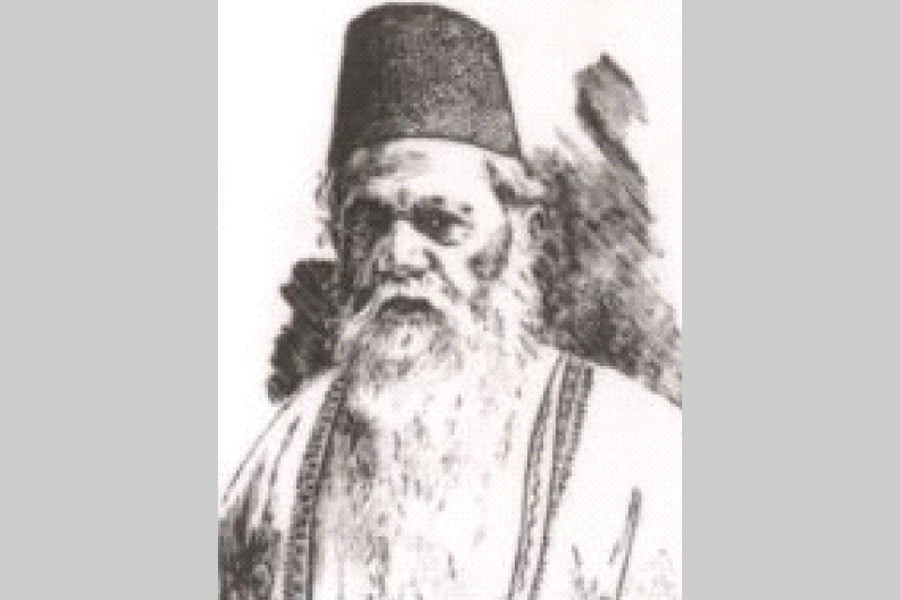The late Dr. Muhammad Shahidullah (July 10, 1885-July 13, 1969) was our national pride because of his many glorious contributions to our national heritage, language and culture.
As a celebrated philologist, Dr. Shahidullah made our national language Bangla significant and meaningful by discovering its root and at the same time by reforming its terms and terminology. His thoughts on our national identity and educational, religious, political and social reconstruction enlighten us even today. His proficiency in 18 classical languages was an example of his indomitable spirit and scholarship. He picked up quite a few languages in his school life -- Urdu and Persian to maintain family tradition, Bengali, English and Sanskrit to fulfill academic requirements, and Hindi and Udiya from neighbours in Howrah.
Dr. Shahidullah passed the Entrance examination in 1904 and FA in 1906 taking Sanskrit as a second language. He was admitted to Hooghly College in B.A class with honours in Sanskrit. But he fell ill and gave up studies for two years. He passed Honours Examination from Calcutta City College in 1910. He then enrolled himself in Sanskrit department of the Calcutta University for his Masters course. But some teachers of the department refused to teach Vedas and Vedanta to a Muslim student. This refusal created what came to be known as "Shahidullah Affair." The editor of The Comrade, Maulana Muhammad Ali, wrote: "Students of the Classics would no doubt be attracted by the inexhaustible mines of literature and philosophy in Sanskrit and Arabic. And while we hope that Muslims scholars would learn Sanskrit in larger numbers than we do at present, we trust such incidents as the 'Shahidullah Affair,' when a Pundit of Calcutta University refused to teach a Muslim student, would not recur." Mr. Suren Banerjee, editor of The Bengali, wrote. "Today, these orthodox pundits should be thrown into the Ganges." But unfortunately, orthodoxy won the game. The Calcutta University Senate was compelled to open a new department on Comparative Philology and Shahidullah was the first and only student of the department, and passed MA in 1912. Though he was not allowed to take Sanskrit in his Masrers, it showed him the way of learning different languages as a student of comparative philology.
With the recommendation of the Vice Chancellor of Calcutta University, Sir Ashutosh Mukherjee, and the patronage of Nawab Ali Choudhury, Shahidullah was awarded a state scholarship to study Sanskrit in Germany. But he could not avail of the opportunity on medical grounds. He then passed LLB examination from the Calcutta University in 1914. It may appear strange that Shahidullah studied LLB after obtaining an MA degree in comparative philology. Obviously, he did so to acquire knowledge.
Shahidullah joined the bar at Bashirhat Subdivisional Court and practised there until 1919 when he got a message from Sir Ashutosh Mukherjje, who wrote: "Shahidullah, the Bar is not for you, please join us in the university." He became the research assistant of Dinesh Chandra Sen in the Calcutta University. Later, he joined Dhaka University when it was established in 1921.
While serving in the Department of Bengali and Sanskrit in the University of Dhaka in 1926, he took study leave for two years and attended Sorbonne University in Paris. He studied Vedic and Buddhist Sanskrit, Tibetan and Old Persian languages. He worked on a thesis paper titled "Les chants mystics" (Songs of the mystics), and simultaneously studied phonetics in the institute of Archive Della Parole, where he submitted a research paper entitled, "Les sons du Bengali," and was awarded a special diploma. After submitting his thesis paper to the Sorbonne University, he went to the Fribourg University in Germany to study Vedic Sanskrit and Prakrirt.
Dr. Shahidullah delved deep into the history of Old and Middle Age Bangla literature, wrote books on these subjects. He also took active interest in folk literature of Bengal. Noteworthy among his books are "Sindabad Saodagarer Galpo," "Bhasha O Shahitya," "Bangala Byakaran," "Diwan-i-Hafiz," "Padmabati" (Volume I), "Bangla Shahityer Kotha" (Volumes I and II) and more. His "Buddhist Mystic Songs" (1960) is a translation and an edited version of the "Charyapada".
Dr. Shahidullah was made Professor Emeritus by the University of Dhaka (1967) and awarded 'Knight of the Orders of Art and Letters' by the French government (1967) for his lifetime achievement in research on language and literature.
Dr. Muhammad Shahidullah played an important role in the language movement. He was the first to establish the reasons why Bangla, instead of Urdu, should be the state language of Pakistan. Earlier, he was Secretary to the Bengal Muslim Literary Society (1911) and had presided over many meetings and conventions, including the second Bengal Muslim Literary Convention (1917), Muslim Literary Society Convention in Dhaka (1926), All-Bengal Muslim Youth Convention in Calcutta (1928), All-India Oriental Studies Convention (Philology, 1941) and East Pakistan Literary Convention (1948). He also represented UNESCO at the International Seminar on Traditional Culture in South-East Asia in Madras and was elected its chairman.
Remembering Dr. Muhammad Shahidullah on his death anniversary and paying tribute to his life-long pursuit of learning and commendable contribution to Bengali language and literature is, in fact, a kind of self-awakening for all conciseness citizens of the country.
Dr Muhammad Abdul Mazid is a former secretary and Chairman National Board of Revenue.


